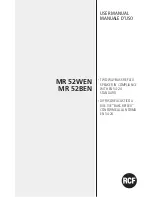
Quick Start Guide for AIT1500 V1.00
1. Introduction
Congratulations on the purchase of your AIT1500 Class B AIS Transponder. It is recommended that your transponder is
installed by a professional installer.
This Quick Start Guide will provide basic information on the AIT1500 to allow you to install and get the
AIT1500 working. The full User Manual for the AIT1500 is available to download on the Support section of
our website
2. Before you start
You will need the following items and tools to complete the installation:
Class B AIS Transponder.
Dedicated VHF/AIS antenna and cable
– not supplied
Access to 12V or 24v DC power supply where the unit is to be installed.
Four M4 screws or other fixings appropriate to the mounting location.
To configure the unit you will need:
A PC running Microsoft Windows XP
®
/ Windows Vista
®
/ Windows 7 or Mac OSX with a free USB port.
proAIS2 Class B AIS Transponder configuration software
– Windows and Mac versions of software are supplied
on the latest Digital Yacht CD-ROM or available for download from the
An MMSI number for your vessel
Note:
You can obtain an MMSI (Maritime Mobile Service Identity) from the same authority that issues ship radio
licences in your area. An MMSI may have already been provided with your existing VHF radio licence. The MMSI
number used for the AIS Transponder should be the
same
as that programmed into your VHF DSC radio.
If you do not have an MMSI number the AIS Transponder will operate in receive only mode.
Do not enter an invalid MMSI number.
3. Installation
Before starting installation select a suitable location for the AIS Class B Transponder. The unit is water resistant; however
it should be installed below deck in a dry location. When locating the unit you should consider:
Routing of power and VHF antenna cables to the unit.
Provision of sufficient space behind the unit for cable connections.
Routing of data connections to PC or chart plotter from the unit.
Maintaining the compass safe distance of 0.5m.
Visibility of the front panel indicators.
Installation Step 1
– VHF/AIS Antenna or Splitter
Install the VHF/AIS antenna (not supplied) according to the hand book instructions supplied with the antenna.
If you are going to share the boat’s existing VHF antenna i.e. use the antenna for both the VHF and AIS, you will
need to install a suitable antenna splitter. It is very important that this splitter is suitable for use with an AIS
Transponder as some of the lower cost splitters only switch one input and are only suitable for use with an AIS
rec
eiver. We recommend our SPL2000 “Zero Loss” Technology splitter.
The AIS antenna connector on the AIT1500 is a BNC type connector and it may be necessary to get a PL259 to
BNC adaptor if you are connecting a normal VHF antenna to the AIT1500 as these are terminated in the standard
PL259 VHF connector.

























